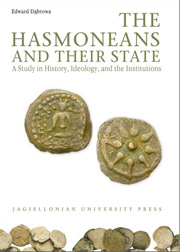Book contents
- Frontmatter
- Contents
- Introduction
- Abbreviations
- Part I Judea under the Hasmoneans (167–63 BCE)
- 1 Mattathias and Judah: In Defense of the Ancestors' Religion
- 2 Jonathan and Simon: A Strategy for Independence
- 3 John Hyrcanus: Securing Independence and the Rise of Expansionist Policy
- 4 Hasmonean Kings
- Part II The Institutions of the Hasmonean State
- Part III Society
- Conclusions
- Bibliography
- Index of Personal Names
- Index of Place Names
- Index of Ancient Sources
- Electrum - Volumes Published
- The Hasmonean State
1 - Mattathias and Judah: In Defense of the Ancestors' Religion
from Part I - Judea under the Hasmoneans (167–63 BCE)
Published online by Cambridge University Press: 05 September 2014
- Frontmatter
- Contents
- Introduction
- Abbreviations
- Part I Judea under the Hasmoneans (167–63 BCE)
- 1 Mattathias and Judah: In Defense of the Ancestors' Religion
- 2 Jonathan and Simon: A Strategy for Independence
- 3 John Hyrcanus: Securing Independence and the Rise of Expansionist Policy
- 4 Hasmonean Kings
- Part II The Institutions of the Hasmonean State
- Part III Society
- Conclusions
- Bibliography
- Index of Personal Names
- Index of Place Names
- Index of Ancient Sources
- Electrum - Volumes Published
- The Hasmonean State
Summary
In the Hellenistic period, independence of peoples inhabiting multiethnic empires was not the subject of any recognized regulations, the very concept of independence (as understood today) being unknown. Following the death of Alexander of Macedon, the political order in the eastern Mediterranean was based on states that rose out of his collapsed empire, headed by the deceased king's generals. Even though the monarchies thus created exhibited many similarities in political structure and organization, in each of them social relations followed a slightly different path, with different economies and cultural traditions. In the Seleucid Empire, a major factor determining state organization was the Achaemenid heritage. Its impact made itself felt especially in Mesopotamia and in the eastern provinces. The use of Persian administrative patterns allowed the Seleucids to manage fairly efficiently, for a while, the vast multiethnic and multicultural territory. Yet, several decades into their reign, they had to face strong separatist tendencies. Those led to the creation within their empire of a number of separate political entities whose leaders made it their aim to win full independence from Syrian kings.
Seleucid attitudes toward their subjects seeking independence from their rule are an important problem in studying Syrian kings' philosophy of government which determined their internal policy. Sources are of little help in pinpointing how the Seleucids went on to lose control over respective lands in their empire and how new states came to arise therein.
- Type
- Chapter
- Information
- The Hasmoneans and their StateA Study in History, Ideology, and the Institutions, pp. 13 - 41Publisher: Jagiellonian University PressPrint publication year: 2009



